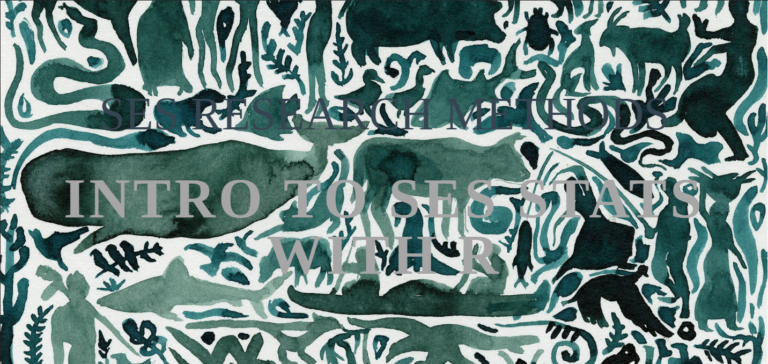This page deals with statistical methods, which are mathematical tools that can help aggregate, present and explore complex datasets from various sources. These methods can be very useful for understanding interactions, dependencies and relationships between social and ecological variables. The content on this page discusses descriptive statistics, regression models, multivariate regression analysis, group comparison, clustering and non-metric dimensional scaling, principal component analysis, redundancy analysis, canonical correspondence analysis, factor analysis, multiple correspondence analysis, and time series analysis.
The Chapter summary video gives a brief introduction and summary of this group of methods, what SES problems/questions they are useful for, and key resources needed to conduct the methods. The methods video/s introduce specific methods, including their origin and broad purpose, what SES problems/questions the specific method is useful for, examples of the method in use and key resources needed. The Case Studies demonstrate the method in action in more detail, including an introduction to the context and issue, how the method was used, the outcomes of the process and the challenges of implementing the method. The labs/activities give an example of a teaching activity relating to this group of methods, including the objectives of the activity, resources needed, steps to follow and outcomes/evaluation options.
More details can be found in Chapter 18 of the Routledge Handbook of Research Methods for Social-Ecological Systems.
Chapter summary:
Fetzer, I. (2022)
Method Summaries
Case Studies
Lab teaching/ activity
Tips and Tricks
- Bors, D.A. 2018. Data Analysis for the Social Sciences: Integrating Theory and Practice.Thousand Oaks: Sage.
- Brown, R.B., and M.P. Saunders. 2007. Dealing with Statistics: What You Need to Know. Berkshire: McGraw-Hill.
- Crawley, M.J. 2015. Statistics: An Introduction Using R. Chichester: John Wiley & Sons.
- Pearl, J. 2003. Causality: Models, Reasoning, and Inference. Cambridge: Cambridge University Press.
- Quinn, G.P., and M.J. Keough. 2002. Experimental Design and Data Analysis for Biologists. Cambridge: Cambridge University Press.

